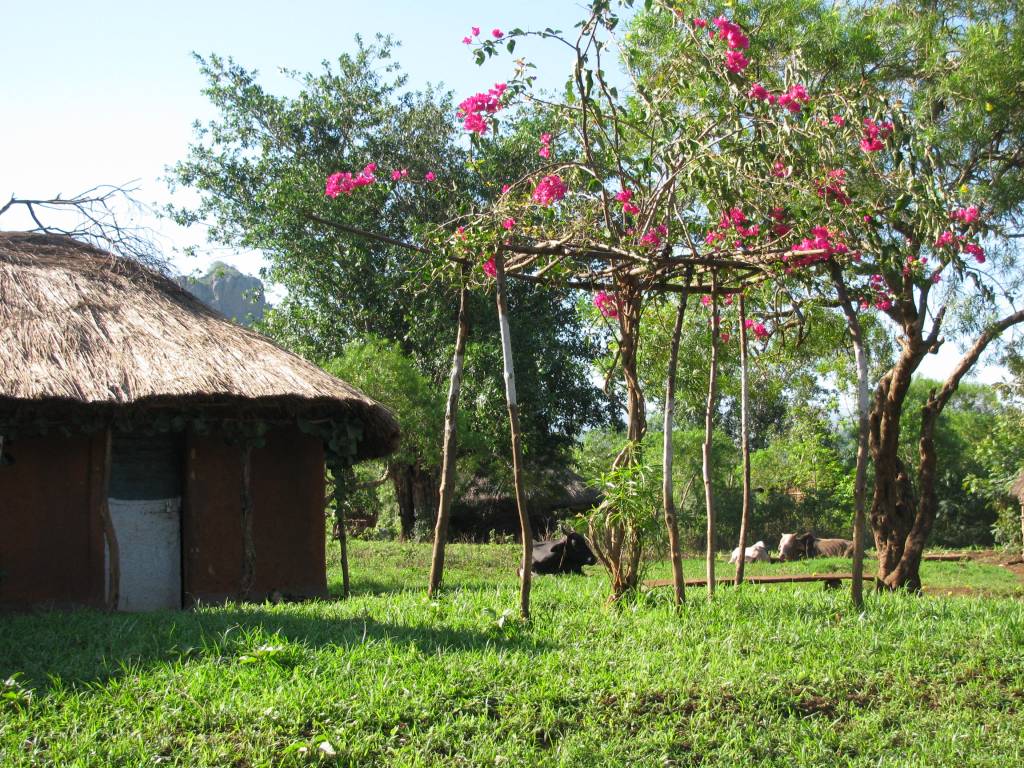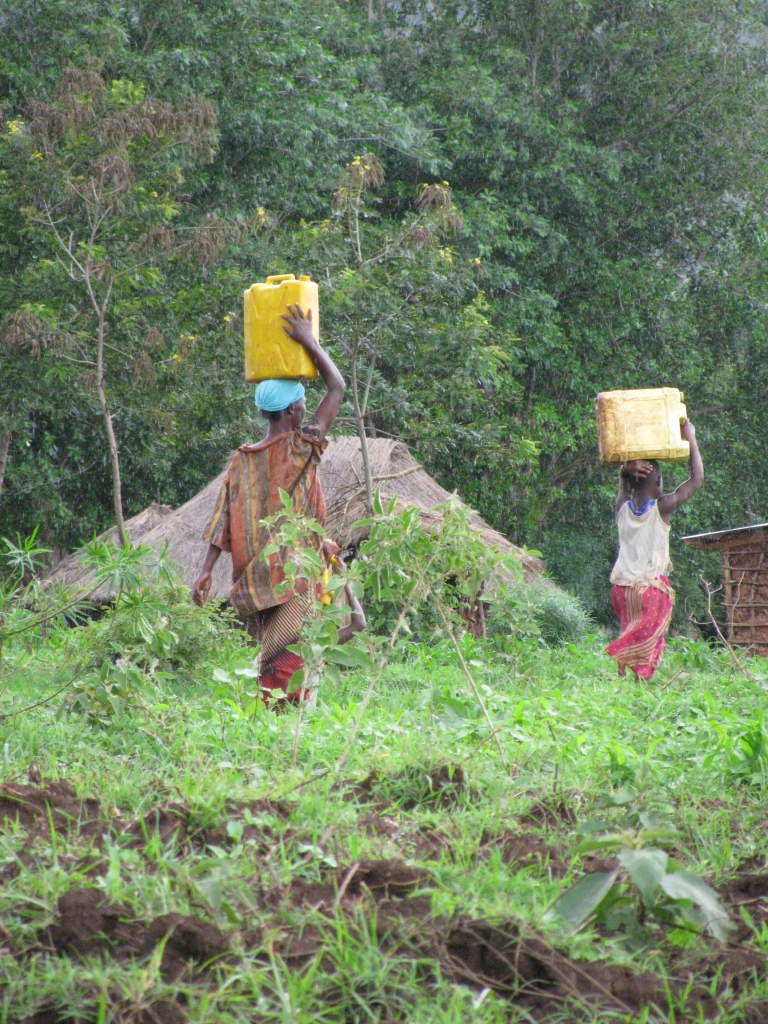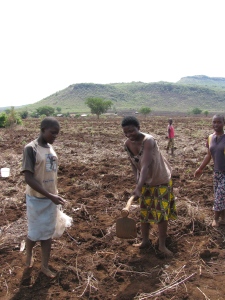Hi Everyone,
Sorry it has been a while since I have been in touch, I have been settling back into life in the UK for the past few weeks and trying to digest what was a truly incredible and life changing experience in Uganda!!
Spending 5 months in Uganda gave me an excellent opportunity to really understand some of the issues facing people living there and to consider and explore potential solutions to some of them. I hope the picture I have painted over the last few months has not been one of doom and gloom, I merely wanted to highlight the many issues and challenges faced by people living in Bunambutye. I must emphasise however what a wonderfully warm, happy and positive place it is despite the great poverty and hardship’s. Im sure from the many photographs I have posted that you can see the joy people experience on a daily basis from simple things such as singing and dancing.
Living in the community, and being the only westerner for miles around, was challenging to say the least, however, I learnt so much from the people I lived with. The Ugandan people are incredibly kind and always willing to make sacrifices for others, they are positive and hopeful even in times of adversity. The most prominent example of this was the way they coped with the food crisis, it was truly admirable. They work together as a community and support each other at times of difficulty. There is an acceptance of what life is like but also a great desire and willingness to improve their lives. They don’t want to be hungry and unable to provide for the basic needs of themselves and their families.
Now that I am home and have had time to start looking objectively at the whole experience I am clearly focused on the longer term solutions. First of all I am going to start the process of setting up a charity so that we can support these communities long term and am currently developing a board of trustees. This is an opportunity for people to get involved with a young, passionate charity and to really make a difference to people’s lives.
As discussed in previous blog posts there are very many needs in the community and the way our work will develop and how we will best support the community is yet to be decided. Hopefully it will all become clear as the board of trustees are formed and enter into discussions and continue to visit and build relationships with the communities and other organisations in Uganda.
So, exciting times ahead... I would love to hear off you if you want to get involved in any way!
Thank-you for all of your support over the last few months!
Aimee
Thursday 26 July 2012
Saturday 9 June 2012
A hectic but fab couple of weeks!

As the title suggests it’s been a busy time! This is largely due to the arrival of Julie and Darren from the UK and their unrelenting enthusiasm to do as much a humanly possible during their time here!! They wanted to spend some time at the school and delivered an age appropriate lesson to every class! Darren also built shelves at the health centre thus creating a health store and myself and Julie gave mosquito nets to mothers who had brought their babies in for their vaccinations.We also decided to take food parcels to 25 of the most vulnerable families I have identified during my time here. This was a hard decision to make as I would not generally agree with giving 'aid' and certainly does not fit with my long term vision of development in the community but Julie and Darren had raised some money to spend whilst they were in Uganda and we decided to help this small number of families at a time of crisis. The majority of the beneficiaries were elderly people caring for children who are either orphans or who have been abandoned by their parents. In order to have a an impact we calculated how much food a family would need to feed them for a week to 10 days, hence the large quantities! It was however a wonderful experience, seeing the shock and joy on the peoples faces and the relief that they would eventually be able to eat for a few days without worrying where their next meal was coming from.
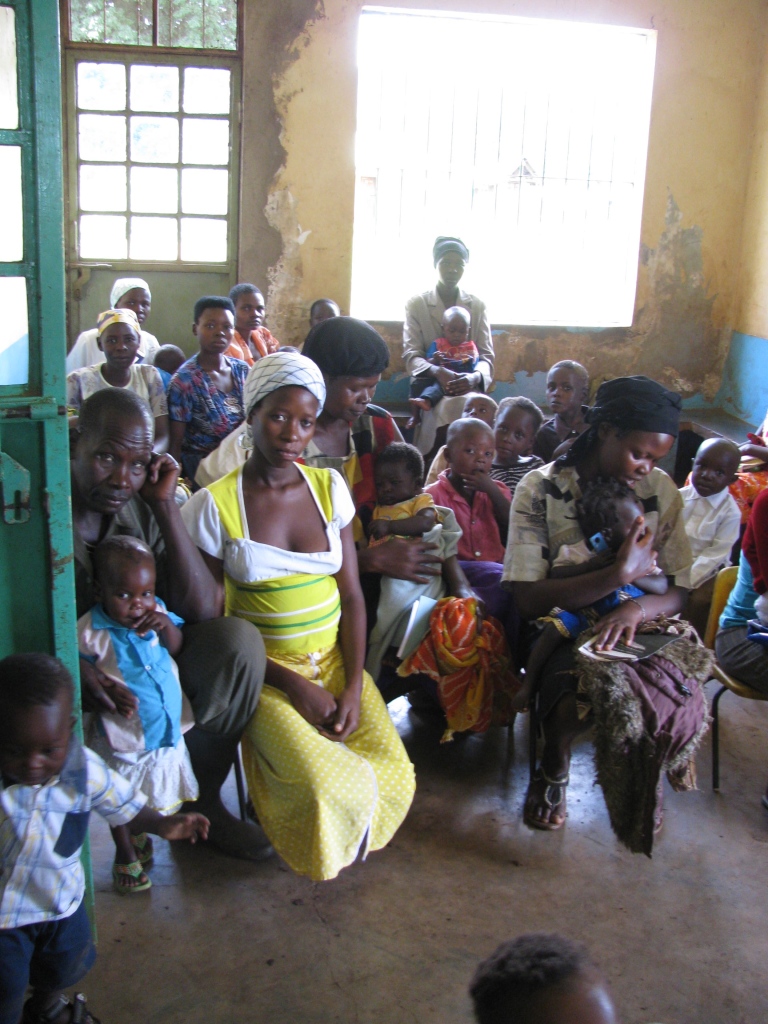
We also visited an orphanage in Mbale and the local nursery school



And also spent some time with a few of the local community groups.
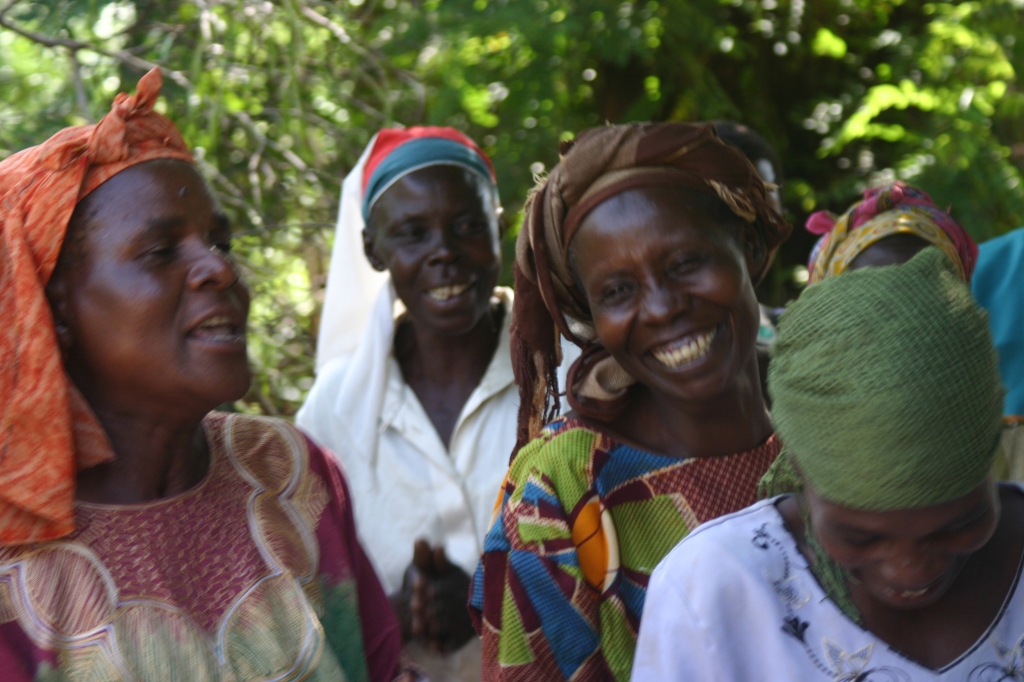
Thank-you Julie and Darren for you hard work and enthusiam both before and during your visit....it has been very much appreciated!
I also hosted the exchange visit this week which I had been planning for some time. I took 18 of the most 'active' community members from the six parishes of Bunambutye to visit groups in Muyembe and Sironko. After a few logistical challenges we were able to have a great day and the feedback was that it had been a great learning experience and rare opportunity for our community members to meet other active community members and to learn about projects and charities in other areas.
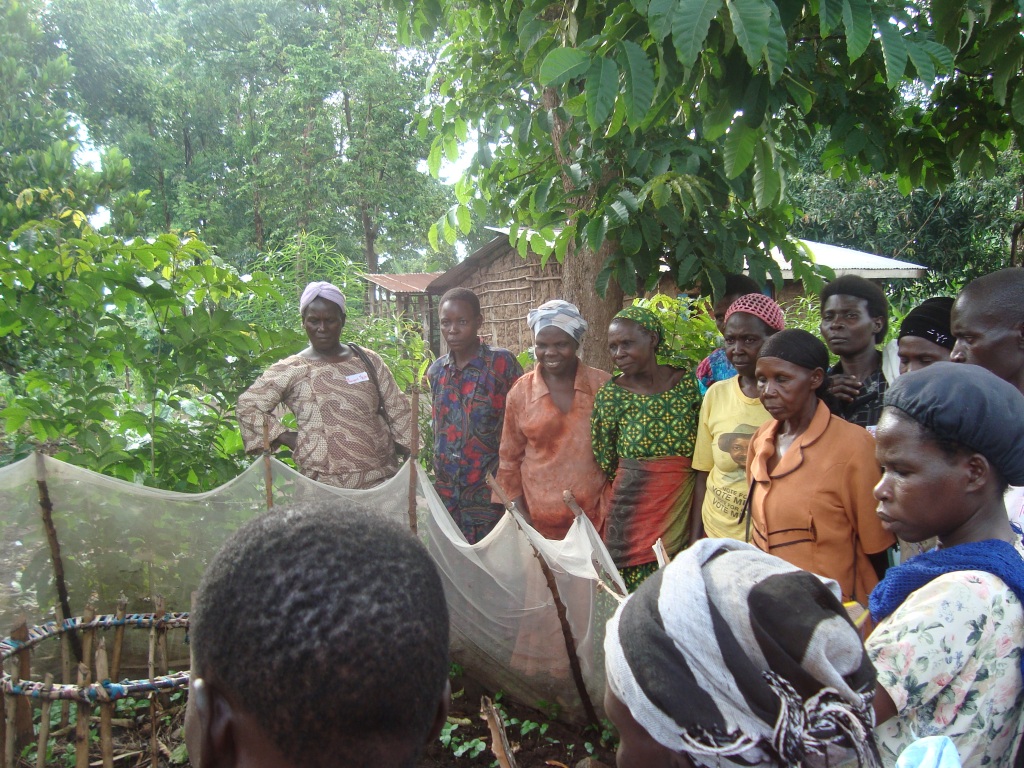

So, as you can see, there is never a dull moment here in Bunambutye!
I will be leaving this amazing place in just over three weeks time so I am now just spending time with the charities I have built relationships with and community members discussing our plans for the future and potential project development. And now comes the next big challenge...setting up a charity in the UK to support this work and hopefully making a real and long lasting impact on these communities!
I hope you continue to support my work and join me on this journey...if you would like to get involved in any way then please just get in touch and let me know!
Many thanks
Aimee
A few more photos...

You can always guarantee a group of children to follow wherever you go!
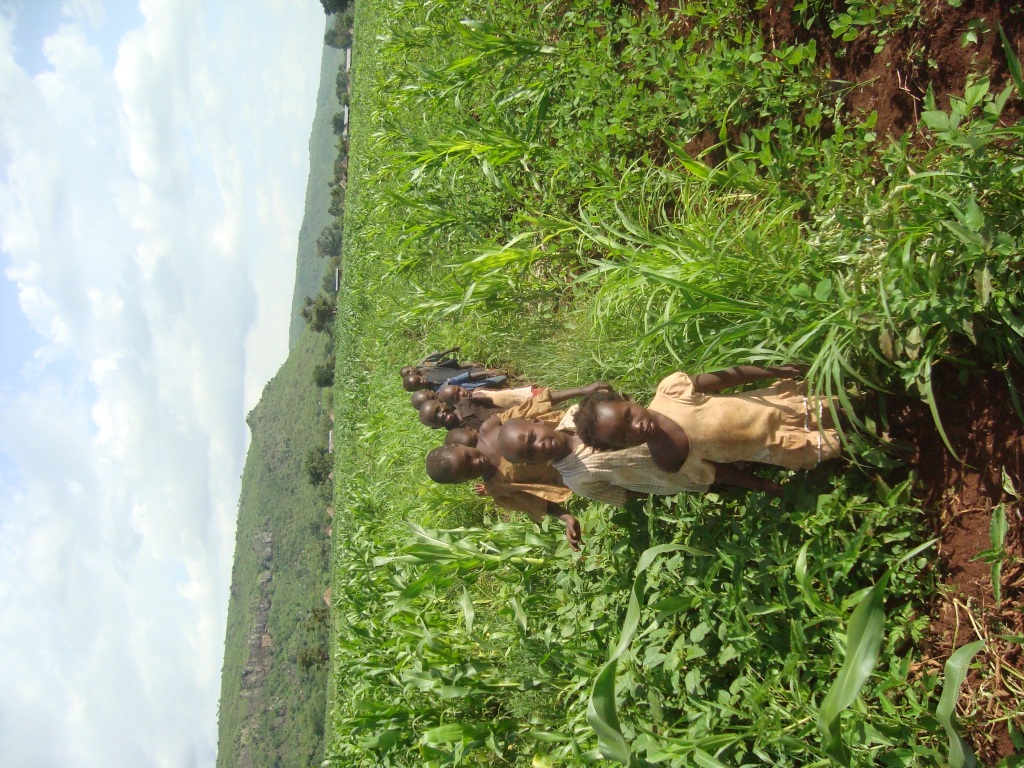


Such a beautiful place!!

An all too common sight unfortunately, children are often burnt by the unprotected stoves they use to cook their food.

Saturday 19 May 2012
May update!
So, another month has gone by, this one started quite tragically unfortunately. When I walk out of my room I can see three huts in front of me, we are separated by the school’s fence. About a month ago there was a gathering outside my room and one of the women from these houses was telling the teachers through the fence that her little girl was very ill and they needed to take her to the hospital in Mbale (30km away). The 2 year old had been sick on and off for about a year, and six months ago had been injected with quinine (for treatment of malaria) and after that she deteriorated and was unable to walk properly. I gave some money to help towards the transport and the family were grateful, I felt like I had helped and basically just went on with my day. For the next few days I asked the teachers how she was and they said that she was back home and improving. I regularly thought to myself as I looked over and waved that I had to go and visit her. However, I never went and then I had a knock on my door, it was her father crying, asking for money to get him to the hospital in Mbale to collect the body of his daughter. I have since found out that the family sold everything they owned to try and treat their daughter. They did not even have a chicken left. They are a young couple, the mother, Jane is only 20 years old and they have another child who is three and they also care for a five year old orphan. They didn’t come asking for money or telling me of their plight, they just did everything in their power to try and help their daughter. This was sadly not enough and like most families living in these communities, in the case of serious illness they are fighting a losing battle and people here so often die of preventable and treatable diseases. 
There are numerous contributing factors to this tragic situation...
I have now bought a supply of mosquitos nets to at least try and prevent some cases of malaria. I have started holding sessions at the local health centre to distribute them. When a mother comes with a small child we invite her to talk to us and a trained staff member ensures that the families are well informed about preventing and treating malaria and will use their nets effectively.
Community Groups
Community groups, in particular, women’s groups, if developed well can support their members, families and the wider community in many ways and really have the potential to reduce poverty. I have collected information on each of the groups and the challenge now is deciding what type of support to offer and to which groups...they all seem so worthy! All of the groups have members who are widows and women who are caring for orphans and / or members with disabilities and all are desperate for assistance! I am very hopeful of being able to deliver some support however and am continuing to build working relationships with the Red Cross, Send A Cow, Wake Up Ministries and BRAC. We have been spending time together in Bunambutye and are excited about developing some programmes and projects together! We have also organised an exchange visit for some group members to meet a well established and successful group who are based 20km away, this group have worked with both the Red Cross and Send A Cow and were very proud to take me around their houses to demonstrate how they had developed and how they are managing to slowly but surely improve their lives and work their way out of poverty.

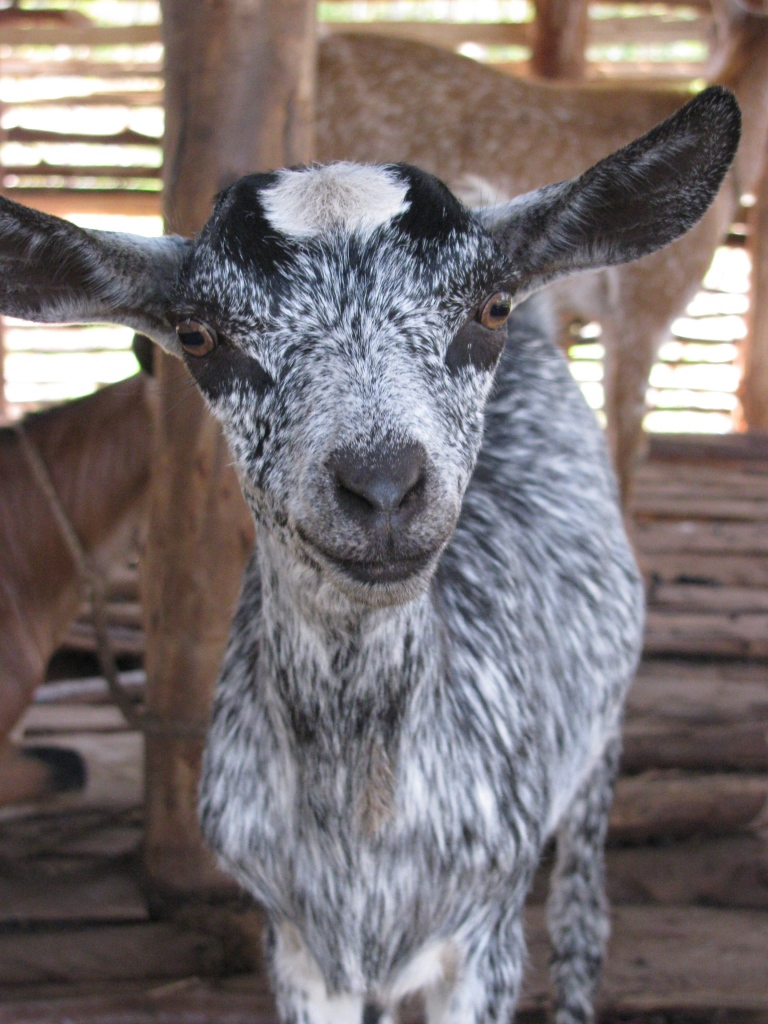 And have also been fortunate to receive improved animals. When they produce, the offspring is given to another group member so the benefit is passed on.
And have also been fortunate to receive improved animals. When they produce, the offspring is given to another group member so the benefit is passed on.
I have also held some group sessions with young people in Bunambutye in order to learn more about their lives. The young girls have an incredibly hard life at home, the challenges they face are overworking, being seem as inferior to men and not having enough food or money. They appeared to have low self confidence and seemed nervous about talking about themselves or discussing any issues they have. The boys do not work so hard at home and seemed to have more time to think about themselves, they are very keen to undertake some income generating activities and were a lot more vocal about the challenges they face and their hopes for the future. What both the boys and the girls want more than anything however is support to continue with their education. They were all uncertain of how long they would be able to stay in school and none of them thought they would be able to attend University. They were looking at me with such hope that I would just come along and sponsor them but of course it is not that easy! Sponsorship for secondary school and university is however what I get approached about more than anything and is certainly a priority need here in these communities.
As I have mentioned in all previous posts, there is a food crises here at the moment as people wait for their crops to grow. And, now to make matters worse there has been flooding! The weather here is extreme and the recent heavy rain has washed away a lot of peoples crops, basically leaving them destitute...it’s really not nice to see people experiencing this. Last year the rain caused landslides and deaths so people are nervous and just hoping that no disasters like this happen again this year.
Thank-you as always for reading and please feel free to comment or get in touch!
En route to church

There are numerous contributing factors to this tragic situation...
- To start with the little girl should have been sleeping under a treated mosquito net.
- She should have been living in a house with a good level of hygiene (this is incredibly difficult to achieve in a mud hut in the rainy season!).
- The medical centre and the parents should have been better informed about the dangers of directly injecting quinine and a more suitable alternative should have been available.
- Suitable treatment should have been available closer to home so that the family did not have to wait until the situation was desperate to take the expensive decision to travel to hospital.
- The treatment would ideally have been free of charge or if not then the family should have been in a position to afford it...
- They should be able to earn a decent living, to be able to access and afford good quality, effective treatment and ultimately live a dignified life free of poverty.
I have now bought a supply of mosquitos nets to at least try and prevent some cases of malaria. I have started holding sessions at the local health centre to distribute them. When a mother comes with a small child we invite her to talk to us and a trained staff member ensures that the families are well informed about preventing and treating malaria and will use their nets effectively.
Community Groups
In the last few weeks I have called meetings in each parish and asked representatives from the various community groups to attend. I have spoken at length to the groups and learnt about their structure, the activities they are undertaking, the activities they would like to do and the challenges they face. All of the groups are keen to develop and have good ideas for how they could work together to reduce their poverty from growing and selling sunflowers and rice to buying chickens, goats and cows for their members. Most of the groups are very new and were only formed in the last year in order to access a government scheme called NAADS. This scheme offers some assistance to groups such as giving seeds or a goat to one or two group members per year. This is at least some support for the people in these communities.
A community group meeting in Bumufuni Parish
One of the main challenges which all of the groups face is capital, they save on average 500 Ugandan shillings per member per week and this is new development for them, until recently they did not undertake group savings. This is the equivalent of around 12p each and is all they can afford (in fact some members described how some weeks they struggle to find even this small amount). As you can imagine, saving this amount does not accumulate to much and the groups use this money to loan to members at times of difficulty such as a medical emergency or a household need. This doesn’t leave anything to develop income generating activities or to start lifting themselves out of poverty.
One of the main challenges which all of the groups face is capital, they save on average 500 Ugandan shillings per member per week and this is new development for them, until recently they did not undertake group savings. This is the equivalent of around 12p each and is all they can afford (in fact some members described how some weeks they struggle to find even this small amount). As you can imagine, saving this amount does not accumulate to much and the groups use this money to loan to members at times of difficulty such as a medical emergency or a household need. This doesn’t leave anything to develop income generating activities or to start lifting themselves out of poverty.
This group makes ropes which they sell for the equivalent of 4p, this project works well for them as they did not need much capital to get started.
Community groups, in particular, women’s groups, if developed well can support their members, families and the wider community in many ways and really have the potential to reduce poverty. I have collected information on each of the groups and the challenge now is deciding what type of support to offer and to which groups...they all seem so worthy! All of the groups have members who are widows and women who are caring for orphans and / or members with disabilities and all are desperate for assistance! I am very hopeful of being able to deliver some support however and am continuing to build working relationships with the Red Cross, Send A Cow, Wake Up Ministries and BRAC. We have been spending time together in Bunambutye and are excited about developing some programmes and projects together! We have also organised an exchange visit for some group members to meet a well established and successful group who are based 20km away, this group have worked with both the Red Cross and Send A Cow and were very proud to take me around their houses to demonstrate how they had developed and how they are managing to slowly but surely improve their lives and work their way out of poverty.
They have been taught how to make energy efficient stoves

‘Kitchen Gardens’ and also vegetable patches which have improved nutrition and food security
They have greatly improved the hygiene in their homes and have noticed a resultant improvement in health.
 And have also been fortunate to receive improved animals. When they produce, the offspring is given to another group member so the benefit is passed on.
And have also been fortunate to receive improved animals. When they produce, the offspring is given to another group member so the benefit is passed on.
The girls
As I have mentioned in all previous posts, there is a food crises here at the moment as people wait for their crops to grow. And, now to make matters worse there has been flooding! The weather here is extreme and the recent heavy rain has washed away a lot of peoples crops, basically leaving them destitute...it’s really not nice to see people experiencing this. Last year the rain caused landslides and deaths so people are nervous and just hoping that no disasters like this happen again this year.
http://www.bbc.co.uk/news/world-14707826
As the final stage of my community consultation I have been visiting every house in one particular parish in order to gain a greater overall understanding of a specific geographical area (100 residences). The previous consultation used a much larger in-depth interview with fewer families over a far wider area, all six parishes. For the purpose of this survey I am just asking for basic household information such as ages of the family, whether there are any people with disabilities, widows or orphans in the household and have just been having a general chat to them about their lives. I thought I had come to really understand about life here in the last few months but the last week doing these visits has really shocked me, I literally cannot see how some people manage to survive! Some families are quite literally starving! So, against my philosophy of only working on long term solutions to the poverty and giving a ‘hand up rather than a hand out’ , I have decided to prepare food parcels to give to families who I feel are suffering and struggling the most, I cant do all or nothing so I have decided to at least try and do something! I will write more about this in my next blog post.
Thank-you as always for reading and please feel free to comment or get in touch!
En route to church
Saturday 21 April 2012
Rainy season...wellies time!
Well, it’s been another eventful few weeks here in Uganda!
The main focus really has been the rain, everyone has been anxiously and eagerly waiting for it to arrive as it is very late this year. Basically, the sooner the rain arrives, the sooner people can plant their seeds and therefore harvest their crops and eat! The preperations have been taking place for weeks...

The land has been ploughed

Grass has been collected for repairing the roof’s of huts
The main focus really has been the rain, everyone has been anxiously and eagerly waiting for it to arrive as it is very late this year. Basically, the sooner the rain arrives, the sooner people can plant their seeds and therefore harvest their crops and eat! The preperations have been taking place for weeks...

The land has been ploughed

Grass has been collected for repairing the roof’s of huts
Seed’s have been sorted ready to be planted. Due to lack of money, most people replant their seeds from the year before, this results in poorer yields as the seeds are not improved or drought resistant. These are Gnuts, they are taken out of their shells, sorted and the good ones are planted. There is a real community spirit with seed sorting, everyone helps each other, chatting and laughing whilst working.

And eventually...the rain has arrived!! It is very late and only time will tell what this season will bring but for now everyone is very happy and out on their land planting their seeds! The rain here is so heavy and is often accompanied with immense lightening!
In terms of the community work, it is progressing extremely well and there have been some exciting developments!
First of all, I had a meeting with the head of Community Development for the Red Cross who is keen to develop some projects in our communities! The Red Cross are very well established and respected here and run a wide range of programmes from community health projects to income generation, food security and irrigation projects. This is very exciting and I have since met with the local team who may be able to organise the volunteers, training and offering technical support. We will give this some serious consideration and continue to meet over the next few months.
I have also had meetings with two microfinance organisations, they offer small loans and saving facilities for people who cannot access traditional banking services. First I met with Five Talents and later with Opportunity International, both are keen to work in Bunambutye and are well aware of the poverty and great need for improved services in this area. In fact, Opportunity were so keen that we got in the car right away and went to meet with the community! There are however some obstacles here as the bank need a certain number of clients in order to operate in an area and it also needs to be established that the community are prepared to take small loans, at present it does not appear that they have received this preparation and therefore taking out small loans could potentially result in future financial hardship.
The Branch Manager and loans officer from the Mbale Branch meeting with some of the local government officials to discuss the possibility of developing services in the area.

And eventually...the rain has arrived!! It is very late and only time will tell what this season will bring but for now everyone is very happy and out on their land planting their seeds! The rain here is so heavy and is often accompanied with immense lightening!
Planting
First of all, I had a meeting with the head of Community Development for the Red Cross who is keen to develop some projects in our communities! The Red Cross are very well established and respected here and run a wide range of programmes from community health projects to income generation, food security and irrigation projects. This is very exciting and I have since met with the local team who may be able to organise the volunteers, training and offering technical support. We will give this some serious consideration and continue to meet over the next few months.
I have also had meetings with two microfinance organisations, they offer small loans and saving facilities for people who cannot access traditional banking services. First I met with Five Talents and later with Opportunity International, both are keen to work in Bunambutye and are well aware of the poverty and great need for improved services in this area. In fact, Opportunity were so keen that we got in the car right away and went to meet with the community! There are however some obstacles here as the bank need a certain number of clients in order to operate in an area and it also needs to be established that the community are prepared to take small loans, at present it does not appear that they have received this preparation and therefore taking out small loans could potentially result in future financial hardship.
The Branch Manager and loans officer from the Mbale Branch meeting with some of the local government officials to discuss the possibility of developing services in the area.
I also went to the Uganda Bureau Of Statistics to get some statistics for developing project proposals and randomly met a principal statistician who is from Bunambutye and has been working on a development proposal complete with lots of statistics and background information!
I also spent a day with Community Development Organisation Jenga, they have been incredibly helpful and given me a lot of advice on developing projects here, they took me to see various projects including a scheme to support orphans and widows and a rainwater harvesting project. We also went to visit some women’s groups which was brilliant...im so keen to develop and support women’s groups as they have so much potential to lift women and their families out of poverty!! I have also met again with Send a Cow and also BRAC, I am hoping to persuade both organisations to offer some support to the communities of Bunambutye. All of the organisations I have met with have been very open to working in Bunambutye but need the funds to do so and have basically suggested that if we can find the funding then we can talk about potential partnerships. It will of course though be difficult to secure this funding without setting up a new organisation which makes me feel that this could be the most effective way of supporting these communities in the long run.
I had a lot of comments from my last blog about the families I introduced so I thought I would introduce you to a few more families this time.
This is Richard with his wife Rukia and daughter Matril, they have four other children who were at school when this picture was taken. Neither Richard or Rukia went to school and have both worked from a very young age as farmers. Life is hard for them and they are stuck in a vicious cycle of poverty. This family have had a lot of tragedy and have had family members die of cholera, malaria and also had a child shot dead by the Karimajong.

The family can often not afford basic things like soap and as a result health and hygiene within the household is poor. They are usually destitute by the time they harvest their crops in August and will sell up to 70% to pay for essential items, leaving them again destitute and hungry and the cycle begins again. Richard is very keen for more charities to work in the area and said that the interventions which would help him and his family the most would be training on improved farming techniques, improved seeds and access to capital / microfinance.
This is Seliah with myself, her husband John and her children Joshua and Patience, they have four other children.
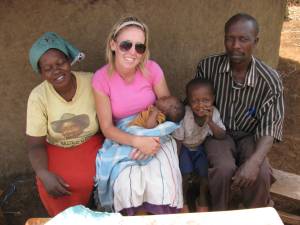
Seliah is from Kenya and they decided to move back to her husbands homeland 3 years ago with the hope of building a better future. They have found it extremely difficult to become established here though and have just a one room mud hut with no latrine, bathing shelter or cooking area. They only have 1/2 acre of land and no animals so therefore no security for difficult times. Seliah gets up at 4am every morning to prepare mandaz (small cakes) to sell at the market but she struggles to even cover her costs and explained that without some capital her business will not grow and she cannot see how they will work their way out of poverty. This year has been particularly difficult for them and they have not yet been able to afford to buy seeds for planting. They left two children with relatives in Kenya, hoping that they would be able to afford to send for them but this is not likely anytime soon.
Seliah and her son are always smiling and are truly lovely people who just want their life to be a little bit easier.
Well, that's all for now, thank-you once again for reading my blog. As always, feel free to comment or get in touch to give me your thoughts!
Aimee
I also spent a day with Community Development Organisation Jenga, they have been incredibly helpful and given me a lot of advice on developing projects here, they took me to see various projects including a scheme to support orphans and widows and a rainwater harvesting project. We also went to visit some women’s groups which was brilliant...im so keen to develop and support women’s groups as they have so much potential to lift women and their families out of poverty!! I have also met again with Send a Cow and also BRAC, I am hoping to persuade both organisations to offer some support to the communities of Bunambutye. All of the organisations I have met with have been very open to working in Bunambutye but need the funds to do so and have basically suggested that if we can find the funding then we can talk about potential partnerships. It will of course though be difficult to secure this funding without setting up a new organisation which makes me feel that this could be the most effective way of supporting these communities in the long run.
I had a lot of comments from my last blog about the families I introduced so I thought I would introduce you to a few more families this time.
This is Richard with his wife Rukia and daughter Matril, they have four other children who were at school when this picture was taken. Neither Richard or Rukia went to school and have both worked from a very young age as farmers. Life is hard for them and they are stuck in a vicious cycle of poverty. This family have had a lot of tragedy and have had family members die of cholera, malaria and also had a child shot dead by the Karimajong.

The family can often not afford basic things like soap and as a result health and hygiene within the household is poor. They are usually destitute by the time they harvest their crops in August and will sell up to 70% to pay for essential items, leaving them again destitute and hungry and the cycle begins again. Richard is very keen for more charities to work in the area and said that the interventions which would help him and his family the most would be training on improved farming techniques, improved seeds and access to capital / microfinance.
This is Seliah with myself, her husband John and her children Joshua and Patience, they have four other children.

Seliah is from Kenya and they decided to move back to her husbands homeland 3 years ago with the hope of building a better future. They have found it extremely difficult to become established here though and have just a one room mud hut with no latrine, bathing shelter or cooking area. They only have 1/2 acre of land and no animals so therefore no security for difficult times. Seliah gets up at 4am every morning to prepare mandaz (small cakes) to sell at the market but she struggles to even cover her costs and explained that without some capital her business will not grow and she cannot see how they will work their way out of poverty. This year has been particularly difficult for them and they have not yet been able to afford to buy seeds for planting. They left two children with relatives in Kenya, hoping that they would be able to afford to send for them but this is not likely anytime soon.
Seliah and her son are always smiling and are truly lovely people who just want their life to be a little bit easier.
Well, that's all for now, thank-you once again for reading my blog. As always, feel free to comment or get in touch to give me your thoughts!
Aimee
Saturday 24 March 2012
Learning about life in the villages...
The last couple of weeks I have been conducting in-depth interviews with residents in four of the parishes of Bunambutye. It has been a totally incredible experience and I have met some wonderful people and learnt so much about life in the villages and the many challenges facing the people living here.
We have been working non-stop to try and meet with as many people as possible before the rain arrives and everyone will be out in their gardens and farms planting their crops. I really would not know where to start with trying to discuss the many findings but taking health for example, some of the findings are that;
The vast majority of children sampled have been born at home with no trained health professional present,
The majority of families have lost children to preventable diseases,
All families are affected regularly by malaria and only one family I have spoken to have enough mosquito nets
The health centre has very poor facilities and resources, it has no midwife, and frequently no drugs. People quite often do not even go to the health centre as they fear they will need treatment which they will not be able to afford. This lady for example wanted me to take a picture of the painful growths she has on her body which she has not sought any treatment for. (Sorry, I know this is quite a graphic start to my blog!)
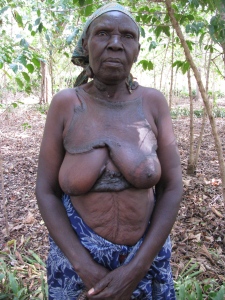
Some photo’s of the health centre...

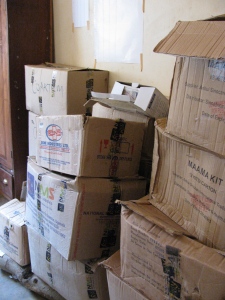
The drug store
The incomes of the villagers are extremely low as most of them are subsistence farmers who only sell their crops to pay for essentials such as soap, sugar, school fees and medical emergencies. All of the families interviewed are aware of ways in which they could increase and diversify their incomes but simply have not been given the opportunity and do not have the resources to do so. Facilitating access to microfinance and business skills training are certainly areas for potential development and ones which I will endeavour to explore.
The recurring pattern of drought and famine is quite shocking, there is basically a food shortage every year at around this time and malnourishment is a serious problem. There are no irrigation systems in place so they only harvest once a year in July / August and by this time of year (March / April) they have used or sold all of the last harvest and they are just trying to scrape by until they harvest again. The extent of the food shortage depends on the previous years harvest which is getting worse due to climate change and the resultant unreliable rain. Many people look for work as laborers at this time where they can earn around £1 a day which is just enough to buy some flour to make posho for the family. Posho is the staple diet here, it is a stodgy, flavourless food made of maize flour. At this time of year it is often not supplemented by any other foods and is often eaten only once a day.
Food security is definitely a priority need and something which the government is attempting to address. It is a complex and large scale problem however and huge amounts of resources are needed in order to tackle the problem effectively, resources which the government unfortunately do not appear to have. Irrigation on the other hand does not seem to be high on the government's lists of priorities, despite the fact that irrigation could well be a key factor in improving food security.
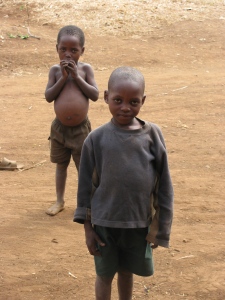
Robert, the Parish Chief is passionate and knowledgable about the development of his community and has been a great support, he has organised all of the interviews and patiently sat through and translated each of them....they are very long with each one taking about 2 and a half hours!
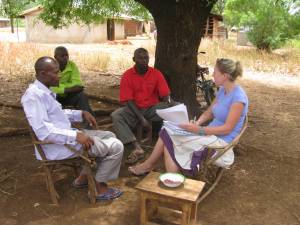
Me and Robert (red t-shirt) conducting an interview
An introduction to a few of the participants...

This lady (Jennifer) is looking after 15 of her children and grandchildren, all of the grand-children’s parents have died from aids and so have four of her grand-children. She looks after the remaining children on an extremely low income in a very small house, all of the children are in school and doing well...she is incredible and I literally don’t know how she does it!! She would love to have her own shop one day to help pay for all the school fees.

This lady (Anna) is one of Bunambutye’s buisness women / entrepreneurs. She sells matoke and tomatoes on the side of the road. She would really like to receive business training and a small loan so that she can grow her business and to expand her range of products to increase her income.
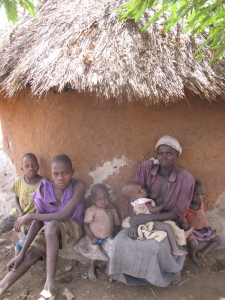
This lady (Naome) and her family are living in severe poverty, they live in a one room mudhut and are really struggling to survive. An example of the effect that poverty has had on their life is from a couple of years ago. One of her children fell ill and she took him to the medical centre for treatment, they referred her to the hospital 10 km away as the child needed a drip which was not available locally. She had no money for transport so she started to walk carrying the child and the child died on the way to the hospital. I found it heartbreaking that this could actually happen and felt more motivated than ever to try and make some positive changes in these villages so that occurrences like this can hopefully someday become a thing of the past.
Despite the hardships the families are evidently facing they have greeted me with openness, positivity, warmth, enthusiasm and hope. I have also been shown great generosity with many of the families giving me a gift such as eggs, tomatoes or some milk, this is a big sacrifice especially at this time of year and never fails to be extremely humbling.
Some pictures taken in the villages...
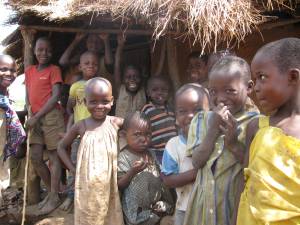
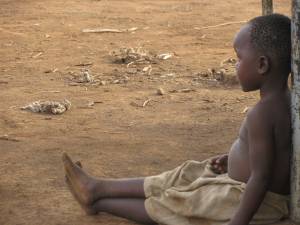



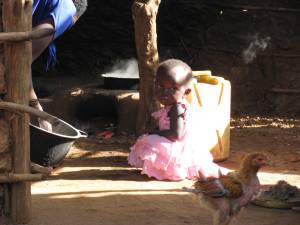

Another outcome of the consultation is meeting a lovely little girl called Pheobe. After watching a documentary based in a local hospital I decided to add a question about hydrocephalis onto the questionnaire. Through this I became aware of Pheobe who is 3 and a half and was born with the condition. She did not complete her treatment as her parents could not afford the transport costs (the hospital is 30km away) and has not been to see a doctor for almost three years. We went to visit her at home and found that she is very underdeveloped for her age, her head appears large and heavy and she struggles to hold it up and she cant crawl or walk and isn’t toilet trained. I went with her and her Mum back to the hospital where they taught her about physiotherapy and gave her some exercises.

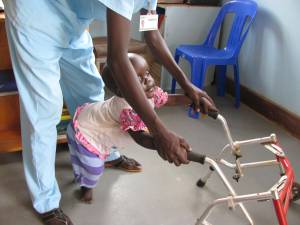

Phoebe's home
I have also had the opportunity to attend a 4 day training course for local civil servants developed and funded by USAID on development planning, local and national government and it's initiatives, environment, HIV, health and gender...it was very interesting and a great opportunity to meet people.
Anyway, that’s quite enough for now, if you have any questions / comments or suggestions please get in touch and ill reply as soon as possible
Thanks for reading!
We have been working non-stop to try and meet with as many people as possible before the rain arrives and everyone will be out in their gardens and farms planting their crops. I really would not know where to start with trying to discuss the many findings but taking health for example, some of the findings are that;
The vast majority of children sampled have been born at home with no trained health professional present,
The majority of families have lost children to preventable diseases,
All families are affected regularly by malaria and only one family I have spoken to have enough mosquito nets
The health centre has very poor facilities and resources, it has no midwife, and frequently no drugs. People quite often do not even go to the health centre as they fear they will need treatment which they will not be able to afford. This lady for example wanted me to take a picture of the painful growths she has on her body which she has not sought any treatment for. (Sorry, I know this is quite a graphic start to my blog!)

Some photo’s of the health centre...


The drug store
The incomes of the villagers are extremely low as most of them are subsistence farmers who only sell their crops to pay for essentials such as soap, sugar, school fees and medical emergencies. All of the families interviewed are aware of ways in which they could increase and diversify their incomes but simply have not been given the opportunity and do not have the resources to do so. Facilitating access to microfinance and business skills training are certainly areas for potential development and ones which I will endeavour to explore.
The recurring pattern of drought and famine is quite shocking, there is basically a food shortage every year at around this time and malnourishment is a serious problem. There are no irrigation systems in place so they only harvest once a year in July / August and by this time of year (March / April) they have used or sold all of the last harvest and they are just trying to scrape by until they harvest again. The extent of the food shortage depends on the previous years harvest which is getting worse due to climate change and the resultant unreliable rain. Many people look for work as laborers at this time where they can earn around £1 a day which is just enough to buy some flour to make posho for the family. Posho is the staple diet here, it is a stodgy, flavourless food made of maize flour. At this time of year it is often not supplemented by any other foods and is often eaten only once a day.
Food security is definitely a priority need and something which the government is attempting to address. It is a complex and large scale problem however and huge amounts of resources are needed in order to tackle the problem effectively, resources which the government unfortunately do not appear to have. Irrigation on the other hand does not seem to be high on the government's lists of priorities, despite the fact that irrigation could well be a key factor in improving food security.

Robert, the Parish Chief is passionate and knowledgable about the development of his community and has been a great support, he has organised all of the interviews and patiently sat through and translated each of them....they are very long with each one taking about 2 and a half hours!

Me and Robert (red t-shirt) conducting an interview
An introduction to a few of the participants...

This lady (Jennifer) is looking after 15 of her children and grandchildren, all of the grand-children’s parents have died from aids and so have four of her grand-children. She looks after the remaining children on an extremely low income in a very small house, all of the children are in school and doing well...she is incredible and I literally don’t know how she does it!! She would love to have her own shop one day to help pay for all the school fees.

This lady (Anna) is one of Bunambutye’s buisness women / entrepreneurs. She sells matoke and tomatoes on the side of the road. She would really like to receive business training and a small loan so that she can grow her business and to expand her range of products to increase her income.

This lady (Naome) and her family are living in severe poverty, they live in a one room mudhut and are really struggling to survive. An example of the effect that poverty has had on their life is from a couple of years ago. One of her children fell ill and she took him to the medical centre for treatment, they referred her to the hospital 10 km away as the child needed a drip which was not available locally. She had no money for transport so she started to walk carrying the child and the child died on the way to the hospital. I found it heartbreaking that this could actually happen and felt more motivated than ever to try and make some positive changes in these villages so that occurrences like this can hopefully someday become a thing of the past.
Despite the hardships the families are evidently facing they have greeted me with openness, positivity, warmth, enthusiasm and hope. I have also been shown great generosity with many of the families giving me a gift such as eggs, tomatoes or some milk, this is a big sacrifice especially at this time of year and never fails to be extremely humbling.
Some pictures taken in the villages...







Another outcome of the consultation is meeting a lovely little girl called Pheobe. After watching a documentary based in a local hospital I decided to add a question about hydrocephalis onto the questionnaire. Through this I became aware of Pheobe who is 3 and a half and was born with the condition. She did not complete her treatment as her parents could not afford the transport costs (the hospital is 30km away) and has not been to see a doctor for almost three years. We went to visit her at home and found that she is very underdeveloped for her age, her head appears large and heavy and she struggles to hold it up and she cant crawl or walk and isn’t toilet trained. I went with her and her Mum back to the hospital where they taught her about physiotherapy and gave her some exercises.



Phoebe's home
I have also had the opportunity to attend a 4 day training course for local civil servants developed and funded by USAID on development planning, local and national government and it's initiatives, environment, HIV, health and gender...it was very interesting and a great opportunity to meet people.
Anyway, that’s quite enough for now, if you have any questions / comments or suggestions please get in touch and ill reply as soon as possible
Thanks for reading!
Subscribe to:
Posts (Atom)












